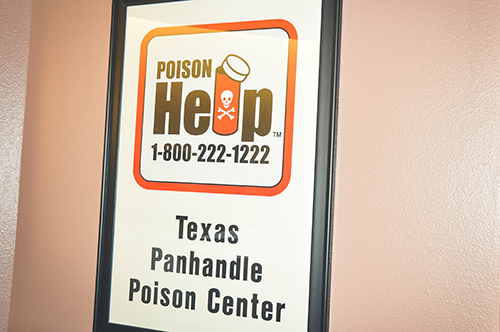TPPC responds quickly to local poisoning tragedy
 On any given day, personnel at the six regional poison control centers that make up
the Texas Poison Center Network (TPCN) field hundreds of calls from the general public, health care providers and
medical facilities. And while it would be inaccurate to categorize any of these inquiries
as routine, few rise to the level of a call that came into the Texas Panhandle Poison
Center (TPPC) in early morning hours of January 2.
On any given day, personnel at the six regional poison control centers that make up
the Texas Poison Center Network (TPCN) field hundreds of calls from the general public, health care providers and
medical facilities. And while it would be inaccurate to categorize any of these inquiries
as routine, few rise to the level of a call that came into the Texas Panhandle Poison
Center (TPPC) in early morning hours of January 2.
That was the date when tragedy struck an Amarillo family in the form of phosphine gas poisoning. Before the day ended, four of the family’s children had passed and the other six members were fighting for their lives.
Thomas Martin, M.D., TPPC’s medical director and a licensed toxicologist, was on duty at the Baptist St. Anthony Health System (BSA) emergency room when the first patients arrived. He called the TPCN to alert them of the situation and the potential for ongoing calls.
Martin said one reason poison centers should be contacted immediately when a potentially critical situation arises is because all regional poison centers in the U.S. are required to have a medical toxicologist available for consultations with physicians and public health and safety providers like HazMat teams, first responders, fire and police.
“Frequently, as in this case, the initial toxin identification at the scene of a multi-casualty incident, or MCI, is incorrectly identified,” Martin explained. “In this case, the receiving health care facility was told that we had a carbon monoxide-related MCI. However, carbon monoxide testing was conducted at the HCF and was negative on the first few victims. The second identified toxin supplied to the health care facility was also incorrect.”
When he learned pesticide pellets containing aluminum phosphide had been spread under the house to eradicate rodents, and then washed away, Martin said he immediately thought it was phosphine gas poisoning. Phosphine gas is created when aluminum phosphate comes into contact with water.
“Getting an experienced medical toxicologist involved early in these cases is useful because we are often able to determine whether or not the signs and symptoms in the victims match the expected signs and symptoms of the identified toxin,” Martin said. “When they don't match, the medical toxicologists informs the HazMat team and further investigation is initiated to identify the toxin.”
 Jeanie Jaramillo-Stametz, Pharm.D., serves as TPPC’s managing director. She said when
poisoning incidents of this magnitude occur, the poison center must be prepared to
provide information and recommendations to health care professionals and field phone
calls from the public.
Jeanie Jaramillo-Stametz, Pharm.D., serves as TPPC’s managing director. She said when
poisoning incidents of this magnitude occur, the poison center must be prepared to
provide information and recommendations to health care professionals and field phone
calls from the public.
“Such severe poisonings, especially those leading to deaths, are likely to create panic or concern among the public,” Jaramillo said. “Therefore, it’s important for our poison centers to be ready to answer these calls, provide consistent and appropriate information and document all of these activities in the interest of public health surveillance and safety.”
Jaramillo said most physicians and staff have never treated a phosphine poisoning because such an exposure is so rare. In addition, Jaramillo said there were first responders who entered the home and were therefore exposed to the poisonous gas. In those circumstances, the poison center also serves as a resource for how to best treat those individuals.
“There was also concern that hospital personnel might be at risk when caring for the victims,” Jaramillo said. “Dr. Martin was able to alleviate their concerns by ensuring staff that, due to the inhalational nature of this exposure, secondary poisoning by receiving site personnel did not present a significant risk.”
The day after the poisonings occurred, TPPC staff participated in a multi-agency post-incident response briefing at the City of Amarillo’s Emergency Management office. The briefing included individuals from the Amarillo Police Department, the Amarillo Fire Department, Emergency Medical Services, BSA, Animal Welfare & Management, HAZMAT, Amarillo Emergency Management, the Texas Commission on Environmental Quality and the U.S. Environmental Protection Agency.
Jaramillo said having a regional poison center is critical to maintaining valuable networking relationships with health care organizations, first responder services, emergency management and various other community groups like schools and public health organizations. And without the visibility of a regional center like TPPC, she said emergency response to this incident would have likely taken much longer. She believes there would have been much more panic at the receiving facility, decisions may have been required—and made—before a qualified toxicologist was located and more deaths may have occurred because the critical need for extremely aggressive treatment may not have been recognized.
“This pesticide poisoning is one of the worst, if not the worst incident since the creation of the TPCN in terms of fatalities,” Jaramillo said. “I can think of no other reported poison incident in Texas that has resulted in this many deaths at one time. TPPC and our sister centers across Texas were able to step up and quickly respond to this incident. In our area, the poison center is viewed as a health care partner and is quickly contacted when incidents occur.”
Because poisonings can and do happen every day, Jaramillo suggests people program the poison control number (1-800-222-1222) into their cell phones.
“And remember, poison centers can provide information regarding not only traditional poisonings, but also questions about medications, including overdoses, as well as questions regarding the use of household products and pesticides” Jaramillo stressed. “People don’t have to suffer a poisoning to utilize the services of our poison centers. They can and should call for answers to any poison-related questions.”
Related Stories
Celebrating Veterans: TTUHSC’s General Martin Clay’s Legacy of Service and Leadership
From his initial enlistment in the Army National Guard 36 years ago to his leadership in military and civilian health care management roles, Major General Martin Clay’s career has been shaped by adaptability, mission focus and service to others.
Texas Tech University Health Sciences Center School of Nursing Named Best Accelerated Bachelor of Science in Nursing Program in Texas
The TTUHSC School of Nursing Accelerated Bachelor of Science in Nursing (BSN) program has been ranked the No. 1 accelerated nursing program in Texas by RegisteredNursing.org.
TTUHSC Names New Regional Dean for the School of Nursing
Louise Rice, DNP, RN, has been named regional dean of the TTUHSC School of Nursing on the Amarillo campus.
Recent Stories
The John Wayne Cancer Foundation Surgical Oncology Fellowship Program at Texas Tech University Health Sciences Center Announced
TTUHSC is collaborating with the John Wayne Cancer Foundation and has established the Big Cure Endowment, which supports the university’s efforts to reduce cancer incidence and increase survivability of people in rural and underserved areas.
TTUHSC Receives $1 Million Gift from Amarillo National Bank to Expand and Enhance Pediatric Care in the Panhandle
TTUHSC School of Medicine leaders accepted a $1 million philanthropic gift from Amarillo National Bank on Tuesday (Feb. 10), marking a transformational investment in pediatric care for the Texas Panhandle.
Texas Tech University Health Sciences Center Permian Basin Announces Pediatric Residency Program Gift
TTUHSC Permian Basin, along with the Permian Strategic Partnership and the Scharbauer Foundation, Feb. 5 announced a gift that will fund a new pediatric residency.
